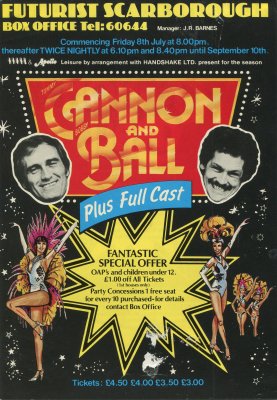
Souvenir Brochure
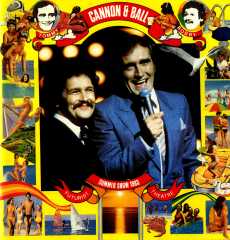
The rise of Cannon and Ball to becoming the most consistently ‘in demand’ double act in the country is one of real success. Success that can be measured in the respect of admiration of their fellow artistes and the loyalty of their ever growing audience. The Cannon and Ball story is one of talent, hard work, and continual striving for perfection. This dedication is amply demonstrated nightly when they ‘top the bill’ at the country’s leading theatres and cabaret clubs.
There cannot be many artistes today who are kept as busy as Cannon and Ball. But their success is no accident, it has been hard won. Indeed, Cannon and Ball have been regarded as one of clubland’s funniest double acts for well over a decade and remain the only entertainers to have won the prestigious Club Mirror ‘Comedy Act of The Year’ award on three separate occasions.
It was in 1961 that Cannon and Ball first worked together for a North West engineering company. It was here that their stage relationship developed. “Tommy used to look after me when I got into trouble. We were always fooling about for the lads at work.” (Bobby Ball)
Encouraged by an enthusiastic response at work, they would often be found in the evenings entertaining a wider audience. This part of homely Lancashire is still the guardian of the music hall tradition. Talent shows and social clubs still play an active part in the community. It was to these that Cannon and Ball turned. Initially they performed as a singing duo. “I used to sing” recalls Bobby Ball, “and Tommy would accompany me on the drums, then we would swap over and Tommy would sing to my accompaniment – all for �3 a night.
However, their talent for comedy soon began to enter the act. Comedy entirely original and unique: comedy loosely based on their working relationship as welders. As the act developed through appearances in the pubs and social clubs of South East Lancashire, they began to look out for opportunites to enter showbusiness.
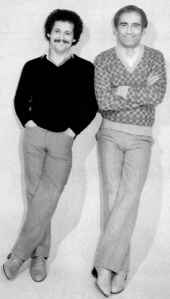
Working mainly in social clubs in the north of England, Cannon and Ball can look back at overcoming some of the toughest audiences in the country. Sometimes they were “paid off” after only one appearance. One night in Newcastle they went on stage to complete silence. They were sitting afterwards in a state of mild shock when the manager came into their dressing room to congratulate them! “You did well lads” he said, “You kept ’em quiet.”
Cannon and Ball not only survived this experience, but learned how to build a following that is now the envy of many top artistes. At this time they were known as ‘The Harper Brothers’. In 1970 they teamed up with their present manager, Stuart Littlewood, who persuaded them that a change of name would be for the better. Over lunch one day the three came up with the name “Cannon and Ball” and from that point they have never looked back.
After two years, Cannon and Ball started to attract attention outside the north of England. In 1965 they began to appear throughout the country. It was now that their earlier tough apprenticeship proved invaluable. They were quickly able to overcome many of the problems that some northern comedians experience when appearing outside their region.
Never having to rely on dialect or stories, their zany style needed only subtle changes.
In 1972 Cannon and Ball undertook tours to Australia and South Africa for cabaret and radio.
However, their early television experiences have been less kind to the pair. Cannon and Ball still look back in anguish to the night opportunity knocked on Hughie Green’s talent programme. “We were terrible”, says Bobby Ball. “We were the proverbial ‘Opportunity flops'”. At the end of their act the clapometer, which registers the audience’s applause “scarcely flickered”, he says.
They were learning. There was another TV chance with ‘The Wheeltappers and Shunters Social Club’. Then came a projected series of appearances on Bruce Forsyth’s ‘Big Night’. But before they had reached the screen the programme had run into ratings trouble and in the subsequent revamping their contributions had ended up on the cutting room floor.
In 1978 they undertook a nationwide tour with the American singer, Gene Pitney, appearing at the London Palladium and other major theatres.
Another TV mis-fire for Cannon and Ball came in July 1979, when technicians pulled the plugs on ITV after two shows of their first series. The couple became known among their colleagues as ‘Cannon and Blackout’, and it was October before the series returned. However, this series established Cannon and Ball as firm favourites with millions.
Their record-breaking panto at Bradford ran into March 1981, when they began work on the Saturday night TV series, followed by a highly successful summer season at Great Yarmouth.
It was a year ago that their second TV series took off and between May and September they filled the 1,500 seats of Blackpool’s North Pier twice-nightly and six times a week.
All 7,000 tickets for a week at a Birmingham theatre were sold out eight months in advance. Even such international stars as Jack Jones, The Three Degrees, and Dionne Warwick, had not attracted such interest, said the manager, who added: “With these bookings we could play them 52 weeks in the year.”
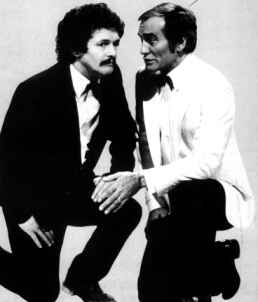
But for a couple of proud north countrymen the final accolade came in the autumn when they were invited to switch on the Blackpool illuminations: an honour which compares roughly with having a rose named after you at the Chelsea Flower Show. Their immediate predecessors in this role were Kermit and Red Rum. “They ran out of animals”, jokes Bobby Ball.
Their LP ‘Rock On Tommy’ gained them a silver disc and their new single ‘Hold Me In Your Arms’, taken from their second LP ‘Cannon and Ball Together’ is selling very well.
1982 has been a sensational year for the boys. Their TV series topped the ratings in May/June and their summer show at Bournemouth broke all previous records, taking over �1m at the box office.
A few years ago, Eric Morecambe named them as “the next double act”, and has since gone on to say: “I like them because they emanate a lot of warmth. Bobby Ball has a lot of heart and Tommy Cannon isn’t just a straight man. Another five years will establish them in a big way”.
They are certainly repaying their early confidence and it is easy to see why Cannon and Ball are so much sought after as top stars in Britain’s theatres and cabarets.
Christmas 82 brought their first ever West End season at the Dominion Theatre, Tottenham Court Road. This ran for seven weeks and once again broke all records for a non-pantomime West End Christmas Show. The advance demand for tickets was so great that virtually every seat for the run had been sold before the show opened. Just three days after the Christmas Show finished, Cannon and Ball attended the Variety Club Luncheon at the London Hilton Hotel where they were proud to receive the ‘Show Business Personalities of the Year’ Award for their achievements in 1982.
During the spring of 1983, Cannon and Ball’s first full length feature film “The Boys In Blue” was premiered in Manchester prior to going on general release throughout the UK.
Programme
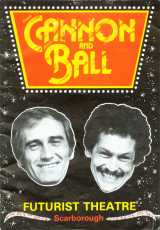
Running Order
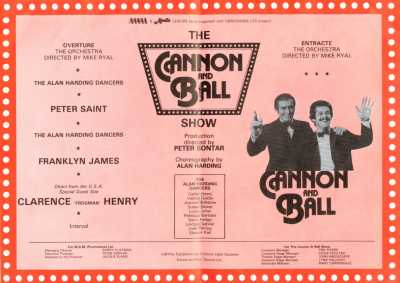
Overture – The orchestra, directed by Mike Ryal
The Alan Harding Dancers
Peter Saint
The Alan Harding Dancers
Franklyn James
Clarence ‘Frogman’ Henry
—
Entracte – The orchestra, directed by Mike Ryal
Cannon and Ball
Cannon and Ball
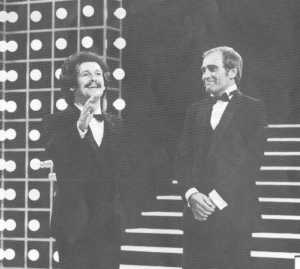
The rise of Cannon and Ball to becoming the most consistently “in demand” double act in the country is one of real success. Success that can be measured in the respect and admiration of their fellow artistes and the loyalty of their ever growing audience. The Cannon and Ball story is one of talent, hard work, and continual striving for perfection. This dedication is amply demonstrated nightly when they “top the bill” at the country’s leading theatres and cabaret clubs.
There cannot be many artistes today who are kept as busy as Cannon and Ball. But their success is no accident, it has been hard won. Indeed, Cannon and Ball have been regarded as one of clubland’s funniest acts for well over a decade, and remain the only entertainers to have won the prestigious Club Mirror “Comedy Act of The Year” award on three separate occasions.
It was in 1961 that Cannon and Ball first worked together, not as entertainers, but as welders for a North West Engineering Company. It was here that their stage relationship developed. “Tommy used to look after me when I got us into trouble. We were always fooling about for the lads at work”. (Bobby Ball) Encouraged by an enthusiastic response at work, they would often be found in the evenings entertaining a wider audience. This part of homely Lancashire is still the guardian of the music hall tradition. Talent shows and social clubs still play an active part in the community. It was to these that Cannon and Ball turned. Initially they performed as singing duo. “I used to sing” recalls Bobby Ball, “and Tommy would accompany me on the drums, then we would swap over and Tommy would sing to my accompaniment – all for �3 a night”.
However, their talent for comedy soon began to enter the act. Comedy entirely original and unique: comedy loosely based on their working relationship as welders. As the act began to develop through their many appearances in the pubs and social clubs of South East Lancashire, they began to look out for opportunities to enter show business.
Working mainly in social clubs in the North of England, Cannon and Ball can look back at overcoming some of the toughest audiences in the country. Lesser artistes have not survived these most demanding and discriminating audiences. Sometimes they were “paid off” after only one appearance. One night in Newcastle they went on stage to complete silence. During their act there was not a flicker of response from the audience, and at the end they came off to the same silence. They were sitting afterwards in a state of mild shock when the manager came into their dressing room to congratulate them! “You did well lads” he said, “You kept ’em quiet”.
Cannon and Ball not only survived this experience, but learned how to build a following whose loyalty and affection is the envy of many top artistes. At this time they were known as The Harper Brothers. In 1970 they teamed up with their present manager, Stuart Littlewood, who persuaded them that a change of name would be for the better. Over lunch one day the three came up with the name Cannon and Ball – and from that point they have never looked back.
After two years Cannon and Ball started to attract attention outside the North of England. In 1965 they began to appear throughout the country. It was now that their earlier tough apprenticeship proved invaluable. They were quickly able to overcome many of the problems that some northern comedians experience when appearing outside their region.
Never having to rely on dialect or stories, their zany style needed only subtle change. In 1972 Cannon and Ball undertook tours to Australia and South Africa for cabaret and radio. However, their early television experiences had been less kind to the pair. Cannon and Ball still look back in anguish to the night opportunity knocked them on Hughie Green talent programme. “We were terrible”, says Bobby Ball. “We were the proverbial ‘opportunity flops’.” At the end of their act the clapometer, which registers the audience’s applause, “scarcely flickered”, he says.
They were learning. There was another TV chance with The Wheeltappers and Shunters Social Club. Then came what appeared to be their big chance with a projected series of appearances on Bruce Forsyth’s Big Night.
But before they had reached the screen the programme had run into ratings trouble and in the subsequent re-vamping their contributions had ended up on the cutting-room floor.
In 1978, they undertook a nation-wide tour with the American singer, Gene Pitney, appearing at the London Palladium and other major theatres.
Another TV mis-fire for Cannon and Ball came in July 1979, when technicians pulled the plug on ITV after two shows of their first series. The couple became known among their colleagues as “Cannon and Blackout” and it was October before the series returned. However, this series established Cannon and Ball as firm favourites with millions.
Their record-breaking panto at Bradford ran into March 1980, when they began to work on the Saturday night TV series, followed by a highly successful summer season at Great Yarmouth. All in all, it was a hectic twelve months for Cannon and Ball. It was a year ago that their second TV series took off and they reached the number 10 spot in the ratings, and between May and September they filled the 1,500 seats of Blackpool’s North Pier twice-nightly and six times a week. There were occasions when enthusiastic audiences stormed the stage.
All 7.000 tickets for a week at a Birmingham theatre were sold out eight months in advance. Even such international stars as Jack Jones, The Three Degrees, and Dionne Warwick, had not attracted such interest, said the manager, who added: “With these bookings we could play them 52 weeks in the year”. But for a couple of proud north- country men the final accolade came in the autumn when they were invited to switch on the Blackpool illuminations: an honour which compares roughly with having a rose named after you at the Chelsea Flower Show. Their immediate predecessors in this role were Kermit and Red Rum. “They ran out of animals”, jokes Bobby Ball.
Their LP Rock On Tommy gained them a silver disc and their new single Hold Me In Your Arms, taken from their second LP Cannon and Ball Together, is selling very well.
1982 was a sensational year for the boys. Their TV series topped the ratings in May/ June and their summer show at Bournemouth broke all previous records, taking over �1m at the box office. At Christmas they starred in their first London West End production at the Dominion Theatre. The whole seven weeks were “sold out” before the show opened.
March 1983 marks another milestone in the career of Tommy and Bobby with the World Premiere of The .Boys In Blue, their first feature film, in which they star with Eric Sykes, Roy Kinnear, Jack Douglas, Suzanne Danielle, and Jon Pertwee.
A few years ago, Eric Morecambe named them as “the next double act”, and has since gone on to say: “I like them because they emanate a lot of warmth, Bobby Ball has a lot of heart and Tommy Cannon isn’t just a straight man. Another five years will establish them in a big way”.
They are certainly repaying this early confidence and it is easy to see why Cannon and Ball are so much sought after as top stars in Britain’s theatres and cabarets.
Clarence ‘Frogman’ Henry
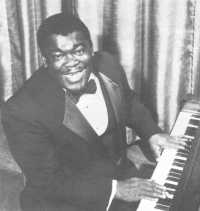
Clarence ‘Frogman’ Henry is a dynamic New Orleans-based Country-Blues star whose contemporary work has been little-known in the UK until now. Yet, millions of golden oldie fans and first-generation DJ’s remember with affection and interest the sing-a- long singles in the early sixties But I Do, You Always Hurt The One You Love, Ain’t Got No Home and others which put the Frogman at the top of the US and British charts, and sold over 12 million copies world-wide from 1959 to 1963.
Twenty years on, in his early forties, and having followed the “Sedaka trail” to record with top session men in Manchester, Clarence ‘Frogman’ Henry is set to reconstruct his British and European career in determined style. A new album, The Legendary Clarence ‘Frogman’ Henry (STLP 1001) was released on March 11th, backed by major record distribution company I.D.S., and a comprehensive nine-week live concert schedule as special guest on the Cannon & Ball tour has been confirmed. Radio and TV slots are presently being set, and a new single will be released shortly.
Clarence Henry’s career spans twenty-five eventful years of pop music and is impossible to chronicle adequately in a paragraph. Discovered in 1957 by Leonard Chess of Chess Records, Frogman has remained an important but enigmatic figure in the R’n’B world. From early days recording and playing with Chuck Berry and Fats Domino, he became influenced by his friend and musical companion Sam Cooke, who was to die tragically in 1963. When the R’n’B boom led by British bands began emerging in 1964, Frogman Henry (then only 27 himself) was cast in the rather bewildering role of an original R’n’B “father-figure” to bands like The Rolling Stones and The Animals, who took New Orleans as their musical jumping-off point. In 1965 Frogman Henry appeared throughout the US as Special Guest on The Beatles’ first coast-to-coast tour.
In the late Sixties and early Seventies, Clarence Henry continued with international touring, playing concerts in Australia, Canada, South America and the Far East. Musically, this period saw him shift into a country-influenced style, and he cut a series of albums in Texas for influential producer Huey Meaux. During the late Seventies, Frogman Henry returned to his home ground in Louisiana, recording with Allen Toussaint in New Orleans and he appeared regularly at R’n’B festivals, special events, revival concerts and Mardi Gras balls, whilst at the same time enjoying a ten-year residency on Bourbon Street, New Orleans, where the Frogman’s nightly cabaret was accurately billed as the top tourist attraction on the strip. In 1982 he refused the inevitable offer to continue in order to earn a break for other projects. One of these was the chance to record in England, and his new album was made in September last year with producer, Geoff Gill, in Manchester.
Franklyn James
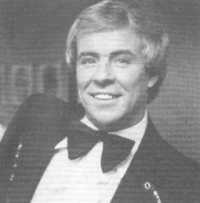
Franklyn started his career as a frontman/vocalist with a popular Manchester group working the cabaret circuits in England and abroad and it was not until 1974 that he decided to go it alone, whereupon he was immediately offered a tour of South Africa. So successful was the tour that he returned twice in that same year, this then led to becoming the support act to a host of big names: Jack Jones, Johnny Mathis, Frankie Vaughan, and many others. More recently Franklyn appeared in Phoenix Arizona and had a successful British tour with Lou Rawls, highlighted by a show at the London Palladium. 1980 saw him in summer season with Jim Davidson and several concerts with Cannon & Ball. Television appearances include London Weekend’s Who Do You Do? and Granada TV’s Wheeltappers & Shunters, and Fully Licensed For Singing and Dancing. 1981 saw Franklyn hosting his own show in summer season in Jersey. He is an artiste whose originality and genuine talent has long been appreciated by other artistes, and agents and managers within the entertainment industry, and there would seem to be some inevitability about his transferring this appreciation to a nationwide public audience in the not too distant future. His humour is fast and subtle, yet with more than a touch of the strange zany quality which the public of the eighties have shown themselves to favour so much, as evidenced by the success of Russ Abbott, John Cleese, Freddie Starr and one or two others who have all, in slightly different ways, found favour by injecting a kind of surreal craziness into their humour. Franklyn would gladly place himself in that school, and yet, unlike that school, he has retained a style of presentation and delivery which is very much his own.
Peter Saint
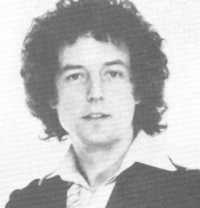
Darlington born singer Peter Saint began singing whilst still at school; he formed a group with schoolfriends and although they used home made equipment they built up a good and steady reputation in the Teesside Area. As the boys reached 17 the group disbanded and Peter joined Blue Caps, one of the most popular groups in the North East of England. Peter gained a lot of very useful experience with this group because their prime aim was to entertain, and through this Peter’s personality began to develop. Two years later Peter made his first move to go solo and joined the Bailey Organisation as a Singer/Compere. He worked at La Ronde at Billingham and at Tito’s Club in Stockton. He moved from Baileys to a similar position at the Showboat Club in Middlesbrough before being invited to take over as Singer/Compere at one of the country’s top nightspots, The Club Fiesta in Stockton. Here Peter worked with some of the biggest names in show business including The Beach Boys, The Four Seasons, Four Tops, Jack Jones, Neil Sedaka, Cliff Richard, Blue Mink and many more. Peter left the Fiesta in February 1976 to develop his talents as a solo artiste. In March of the same year he recorded his first single record which was written and produced for him by one of the members of The Fortunes. Since then Peter has gone from strength to strength, appearing at most of the top cabaret clubs in the UK. He broadcasts regularly on Radio 2 with the Northern Radio Orchestra, and was responsible for both writing and recording the theme song from Tyne Tees Television’s popular programme Friday Live.
In 1979 Peter appeared as the very first artiste on the London Weekend Television series Search for a Star, and was so successful he was invited back as a special guest on the show’s Grand Final. He has been voted Top Male Vocalist in the North East in both 1979 and 1980, and won also BBC Radio Cleveland’s award as Top Male Vocalist! A recent quote in The Stage after Peter’s performance at the North East Clubland’s Awards Show read: “If tumultuous applause had gone before, the roof almost lifted off at the close of the performance by a sylph-like maestro Peter Saint – a young man whose talents are bewildering in their variety. Take the actions of Marcel Marceau, the vitality and pertness of Leo Sayer, multiply, and the image is complete”. Peter appeared with Cannon & Ball in their summer show at Bournemouth last year and he is delighted to be appearing with them again in Scarborough. He has had a busy time over the last twelve months appearing on Central TV’s Starburst programme, Granada TV’s Video Entertainers, with a trip to Australia and a short season cruising with P. and 0. Add to this playing the role of principal boy in pantomime and it is no surprise to see that Peter Saint is a rising star of the eighties.
Peter Sontar – Producer
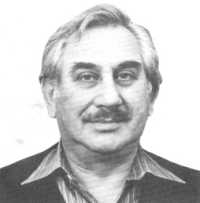
Began his career as assistant stage manager in theatres throughout the UK and eventually became Stage Director at the famous Theatre Royal, Drury Lane. He worked for the New York Theatre Guild as Production Stage Manager for several musicals and spent considerable time with Richard Rodgers and Oscar Hammerstein. He has been associated with international stars such as Shirley Maclaine, The Carpenters, Joel Grey, Steve Lawrence and Edye Gorme, and was Producer/Director for the only UK tour by Perry Como. Last year he produced the highly successful Cannon & Ball show in Bournemouth. In fact he has directed the last ten summer seasons at the Winter Gardens in Bournemouth and at the Floral Hall Theatre, Scarborough, and is engaged in many other productions throughout the country.
Alan Harding – Choreographer
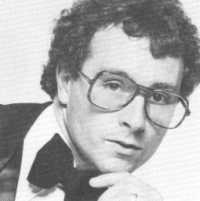
Started his dancing career as a member of the ‘Dougie Squires Second Generation’ and proved to be one of the most talented members of that team. After leaving The Second Generation’ Alan toured America, Canada, Germany and all of Europe, appearing on television shows in all these countries. His television series in Britain includes Seaside Spec/a/, The Mart/ Caine Show and The Max Bygraves Show. He has appeared in many West End musicals, and was featured in the hit show Bubbling Brown Sugar. His fast and exciting choregraphy has aroused much comment and excitement – both on television and on the stage. In the summer of 1981 his pazzazy style was seen to full advantage when he choreographed the Trendsetters at Bournemouth, and he appeared there again last year. He is currently choreographing a new series for Central Television and in addition to The Cannon and Ball Show here at Scarborough he has also choreographed this year’s summer production at the Blackpool Opera House.
Mike Ryal – Musical Director
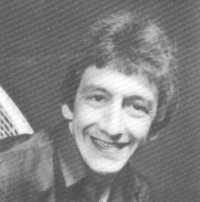
After touring the world with such stars as Marti Caine, Gene Pitney, and an extensive involvement with Tony Christie, Mike has now settled into the prestigious job as Musical Director for our Superstars, Cannon & Ball. Mike started his professional career at the age of 15 when he did session work, and numerous recordings which continued throughout his many years in show business with guest appearances with the Midland Radio Orchestra along with appearances at the Talk of the Town and the London Palladium. His interests include golf and a fervent following of his home football team, Barnsley. Married with three children, Mike is delighted to be with his family in Scarborough for the first time but hopefully not the last.